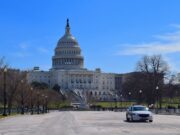Although the recent IRS scandal suggests that bureaucratic control of political associations and political speech is a dangerous idea, “reformers” have used the media attention on the matter to continue their campaign against corporate political expenditures. According to those who wish to further regulate political speech, the “real IRS scandal” is that 501(c)(4) groups took funding from corporate entities and spent it on political ads. House Minority Leader Nancy Pelosi called the scandal “an opportunity” to put “the whole idea of 501(c)(4)s being engaged in politics…in a spotlight.”
Failing to gain support for their efforts in Congress, “reformers” have pursued more burdensome campaign finance regulatory actions through other regulatory bodies – most notably the Internal Revenue Service, Securities and Exchange Commission, and Federal Communications Commission. This movement has left supporters of free political speech on the defensive. The national conversation in many media outlets tends to be framed around corporate corruption, “dark money,” and business entities “buying elections.” We are rarely reminded by politicians or members of the media that the Citizens United decision, boiled down to its essence, was an expansion of free speech and an affirmation of the First Amendment. It allowed more political participation by more people in more ways. Our default assumption ought to be that this is a good thing. When someone calls for anyone’s free speech to be restricted, our first question should be “why?”
The burden, then, is on so-called “reformers” to show why more free speech is inherently a bad thing. The Supreme Court has established, in the form of various Constitutional standards and tests, that the First Amendment doesn’t protect malicious or dangerous speech under certain circumstances. Corporate political speech hasn’t been seditious, slanderous, or obscene. We are supposed to believe, then, that corporate speech is dangerous simply because it’s corporate, and Congress, the IRS, the SEC, the FCC, someone—anyone—needs to restrict it.
But the 2012 elections make that a difficult argument, as some reform-minded members of the media have acknowledged. If 2012 was the reformers’ nightmare scenario – an Armageddon of independent corporate spending that trumps all free speech concerns – how exactly has our nation suffered? People went out and voted, as they have for centuries, and they re-elected President Obama, maintained a GOP majority in the House of Representatives, and left the Democrats in control of the Senate. Is this the catastrophe that supposedly justifies muzzling certain speakers?
The simple fact is that political speech is still just speech. Elections can’t be bought in a nation of voters who aren’t for sale. Perhaps voters heard more voices, or different voices, in the cacophony preceding the 2012 elections, but, as far as anyone can tell, Americans ultimately went out and voted for the man or woman they thought most fit to lead. If corporate political speech doesn’t impinge upon this process, what’s the argument for silencing it? “Reformers” hope to make the IRS scandal their latest excuse for regulating disfavored speakers and opinions.
The next few months could be transformative for the IRS. It could be transformative for campaign finance law, too. Instead of adding caveats and asterisks to the First Amendment to fend off imagined threats, we should be striving to make political speech as free and open as possible, so voters can gather as much information and evaluate as many viewpoints as they care to before they cast their votes in 2014.













